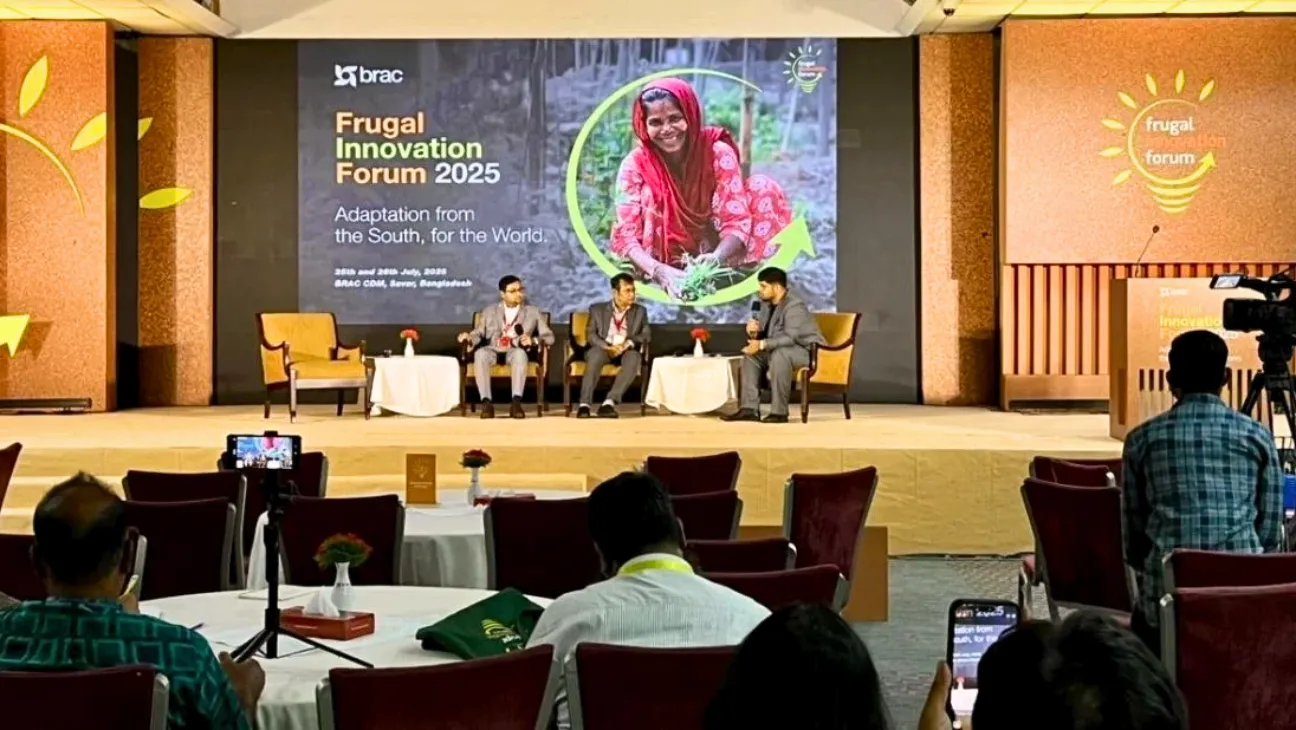Over 200 experts, researchers, and practitioners from across the globe came together this week at the eighth Frugal Innovation Forum (FIF), held at Brac’s Centre for Development Management in Savar.
The two-day event, taking place on July 25 and 26, focused on climate adaptation in agriculture, food security, and livelihoods — with a sharp focus on the Global South.
The forum opened with a moment of silence for the victims of the recent Milestone School and College tragedy. Brac Executive Director Asif Saleh led the opening remarks.
During his virtual keynote speech, former Maldivian president Mohamed Nasheed took direct aim at the global financial system. As Secretary General of the Climate Vulnerable Forum, he argued that it’s fundamentally broken, failing to get climate funds to the countries that are on the front lines of the crisis.
He pointed to borrowing costs that keep developing nations from investing in clean energy and adaptation.
“Affordable finance must be treated as an urgent global priority,” he said.
Saleh echoed that view. “The world is on fire,” he told the audience. “We are nearing a breaking point.”
He cited a $2.3 trillion annual loss globally from climate-related disasters. Most of that, he said, impacts countries in the Global South, where systems are least prepared to manage shocks.
More than 700 million people still live below the $2.15 daily poverty line. Nearly all are in the Global South.
Imagine a modern city with no water. According to Saleh, that’s exactly where Kabul is headed, with its aquifers on a five-year countdown to running dry. And that’s not even the worst of it.
He connects that local disaster to a global one, pointing out that if the planet keeps heating toward 2.7°C, we’re looking at nearly two billion people living under the threat of lethal heat waves.
The forum aimed to highlight locally driven solutions and practical strategies shaped by lived experience.
Over the two days, participants joined panel discussions, exhibitions, and impact talks. Sessions focused on regenerative agriculture, financial inclusion, climate information systems, and market access.
On the first day, moderators included Christina Chan and Ashley Toombs of Brac, along with Degefu Getachew, Kuldeep Bandhu Aryal, and Prof. Anwarul Abedin.
The spotlight was also on some brilliant minds from Brac’s Frugal Innovation program. We heard from Esther Kimani in Kenya, Ghislain Irakoze in Rwanda, and Bangladesh’s own Mubasshir Tahmid, who each offered a unique, grassroots vision for climate resilience.
A whole host of organizations were also there, showing off practical tech. Groups like the SAJIDA Foundation, WeGro, and iFarmer had tools that give smallholder farmers a fighting chance against wild weather, helping them save more of their crops and bounce back after a tough harvest.
Meanwhile, expert panels tackled the big questions: How can we build better insurance for rural families? What kind of seeds can withstand climate shocks? And where will the funding for all this come from?
Everything culminates on July 26 in a final session featuring Syeda Rizwana Hasan, who advises the interim government on climate change. To close things out, Brac Chairperson Dr. Hossain Zillur Rahman will take the stage.
Launched in 2013, the Frugal Innovation Forum has focused on practical development solutions from the Global South. Past editions tackled topics such as digital finance and pandemic recovery.
If there was one clear takeaway this year, it was this: with climate finance getting harder to secure, real adaptation has to start locally. The powerful irony is that the communities facing the biggest threats are also the ones coming up with the most creative solutions.









